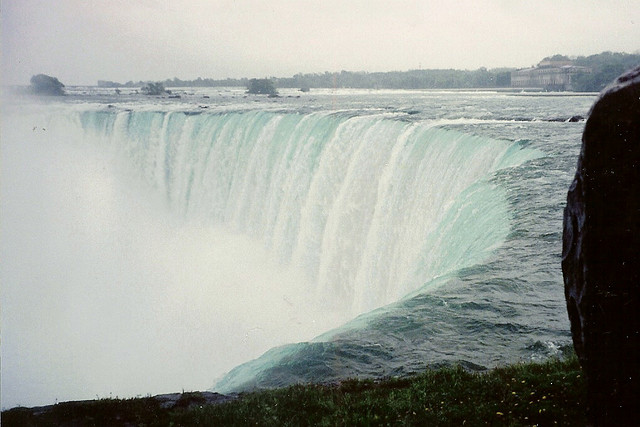All my relations:
We’re living an incredible moment in the constitution of our shared political community and I hope you’ll celebrate with me and so many other Indigenous peoples of Turtle Island.
Following discussions throughout July and August of 1764 and a year of preparation leading up to them, 250 years ago this summer at the Treaty of Niagara, 1764 we reached an understanding as to how we — Indigenous and settler peoples — could live well together. Roughly 2000 citizens of 22 Indigenous nations, almost all of the indigenous peoples Britain had encountered, travelled over months to Niagara. Britain’s conquest of New France in 1760 meant a new relational order had to be established between it and all of the Indigenous peoples who had been allied with New France, which was almost everyone except the six nations of the Haudenosaunee (or Iroquois Confederacy).
It is an error to describe this treaty as just a legal framework for organizing our relationship. A plain reading of the record establishes that following Britain’s participation in and even invocation of Indigenous legal traditions, it was also a political, economic, social, and spiritual framework. In other words, this treaty cannot be understood as a contract. Much more robust than contract, it is a living framework for the complex totality of relationships between settler and Indigenous peoples. The legal traditions of indigenous societies are relationship-centred, not rights-centred. In turning to them, together we constituted a vibrant, flexible framework for political community — the conditions which organize our distinct but interdependent ways of living. Rather than hemming us into narrow, fully-articulated positions, it allowed us to change and grow together. This, the Treaty of Niagara, 1764, is our shared Constitution.
Yet you may be wondering something like this: why should I care? That’s history and I live today. Besides, Canada’s constitution began in 1867, with confederation.
The first reply must be that if you understand that a treaty is a relationship and not a contract, then it isn’t an expended agreement but rather a living framework that survives until we don’t.
But the deeper trouble with the confederation constitutional story is that it positions Canadian citizenship on a foundation of domination. Indigenous peoples were excluded from confederation and thus have not authorized Canada’s exercise of sovereign authority over us: we are not subjects of popular sovereignty. Nor will we ever be. A sovereign-subject relationship is not the story that the Treaty of Niagara tells. And that is the critical understanding all of us need to hold. That is one reason why Indigenous peoples cling to treaties so passionately. That is why something requiring the sustained commitment, spirit, and shared feeling of Idle No More is even imaginable (and may I remind everyone of the stunning fact that while in other parts of the world dominated people often choose violent resistance, we chose to round dance en masse).
Immense harm has resulted from the failure of many non-Indigenous peoples to understand that not only do indigenous peoples have a legitimate argument to be understood as partners in an ongoing relationship but that our relationship as partners is in fact and in law already established. In the absence of this understanding, many Canadians can’t understand why Indigenous peoples aren’t content with how Canada has partially tolerated their uniqueness. Many take their ignorance of the partnership reality further still: they can’t understand even why Indigenous differences should be tolerated – -they want rigid formal equality for all in Canada — and thus promote narratives about Indigenous peoples receiving special treatment and expecting handouts. We’ve all heard those stories; this is how and why they function. Sometimes the anger that flows from this misunderstanding transforms into personal and even national pathologies: the catastrophe of missing and murdered Indigenous women. And let us be clear that this is not an abstract catastrophe of mysterious and ineffable social forces. This is a concrete catastrophe of citizenship. If you understood us as your partners, you would not stand for it.
The confederation constitutional story is a foundation for Indigenous hopelessness. Under the law of nations (international law at the time North America was colonized) there were three ways a European power might acquire new lands: conquest, settlement of a population if no one is already there, and cession (a voluntary agreement between colonizing and colonized peoples). In the 2004 Haida Nation case the Supreme Court of Canada said Canada was not founded on conquest. In the recent Tsilhqot’in Nation case the Supremes also rejected settlement as a possibility. That just leaves cession. But as we have seen through the Treaty of Niagara, 1764, a fully-executed contract is not at all the understanding of treaty that either indigenous peoples or Britain understood.
And yet Canada continues to claim and to exercise sovereign authority over Indigenous peoples and their lands.
And yet the Court refuses to explore the source of that authority all the while insisting that the Crown exercise it anyhow.
Indigenous peoples are thus systematically subject to the unjustified exercise of state power. This is the very meaning of domination. The question for all citizens, indigenous and non-indigenous alike, is whether domination is a foundation for citizenship that we’re willing to accept. The Treaty of Niagara, 1764, through its turn to Indigenous legal traditions, created an alternative that allows us to reject contemporary colonialism and yet which allows all of us to legitimately call these lands home. Instead of waiting for Canada to decolonize itself, it is for each of us as citizens of a shared political community to pick up this Treaty, practise it, and live it.
Aaron Mills (J.D. Toronto, LL.M. Yale) is a Bear Clan Anishinaabe from Couchiching First Nation and from North Bay, Ontario. He is a Trudeau Foundation Scholar, a Vanier Canada Scholar, a doctoral student at the University of Victoria, Faculty of Law and a recent Fulbrighter.



